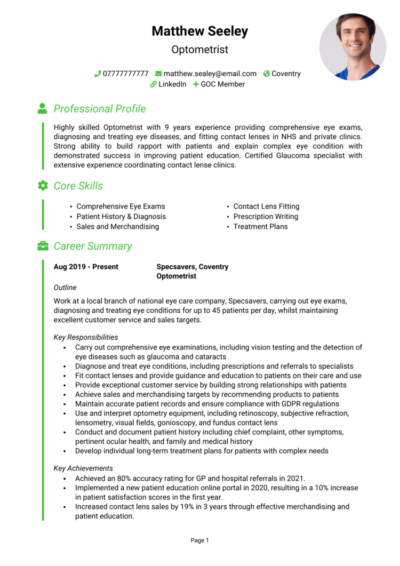Seeing your dream job clearly? Let’s make sure your CV has 20/20 vision too, and stands out from the competition.
These Optometrist CV examples and accompanying writing guide, will show you how to showcase your clinical expertise, technical skills, and patient care experience. Following these steps will let you craft a CV that lands interviews and takes your optometry career to the next level.
Optometrist CV
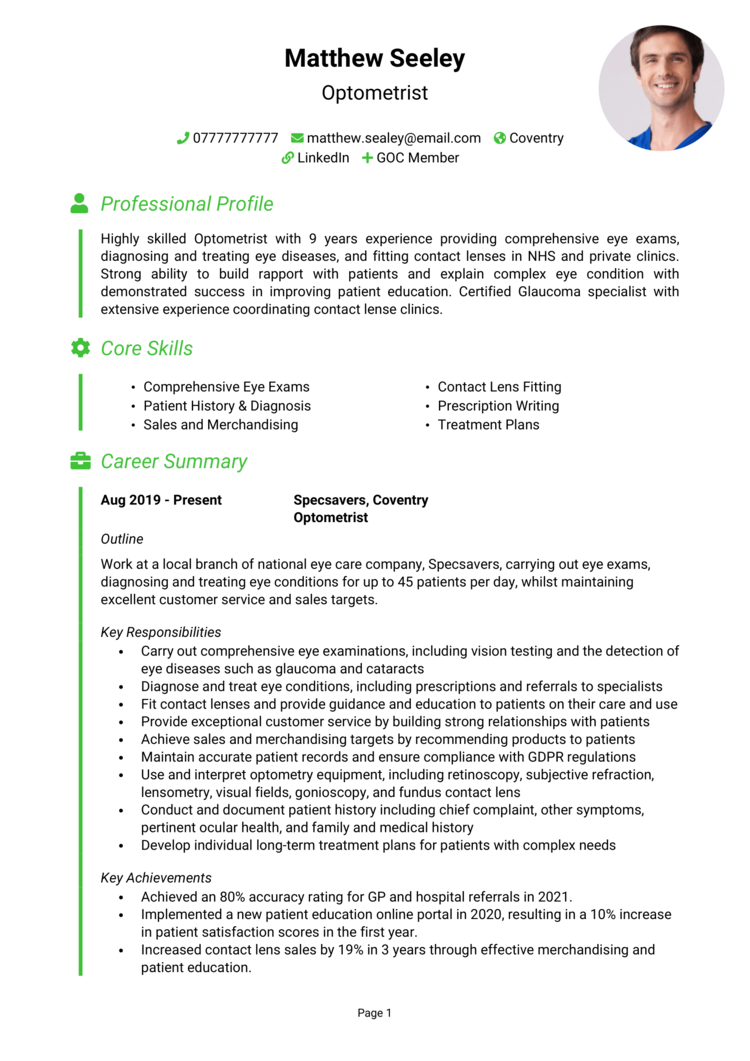
Pre Reg Optometrist CV
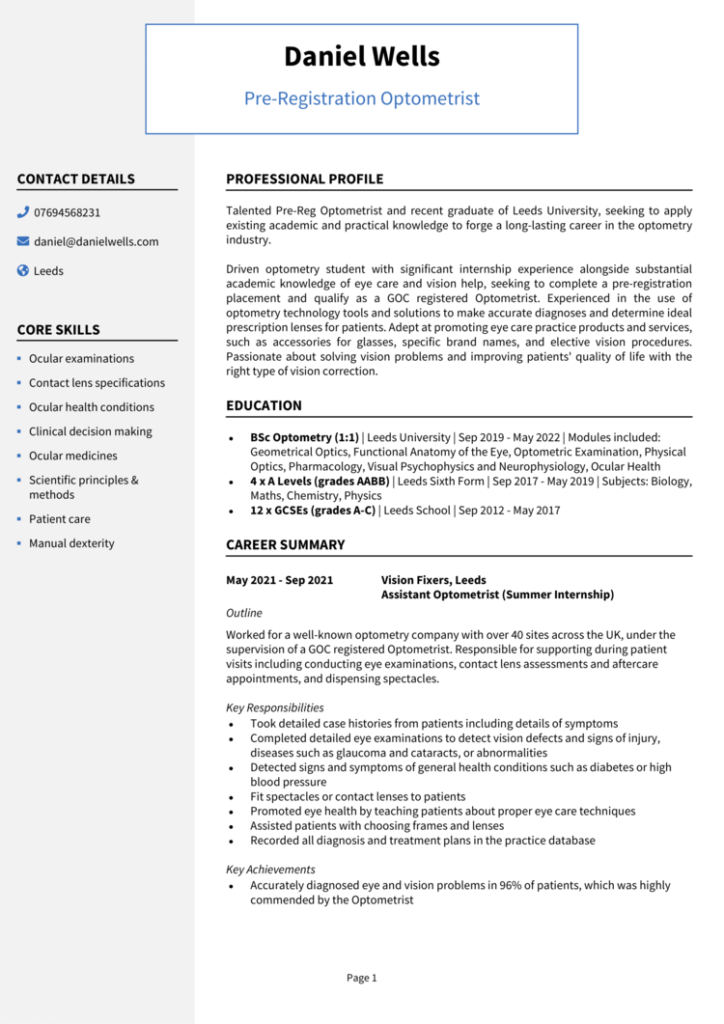
Optician CV
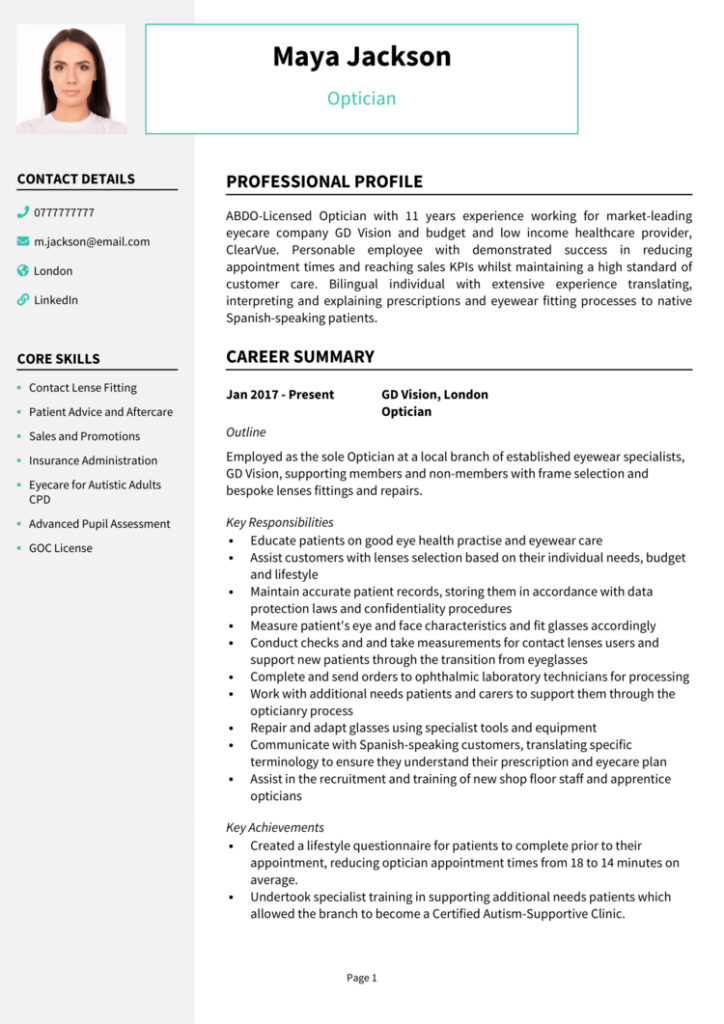
Optical Assistant CV
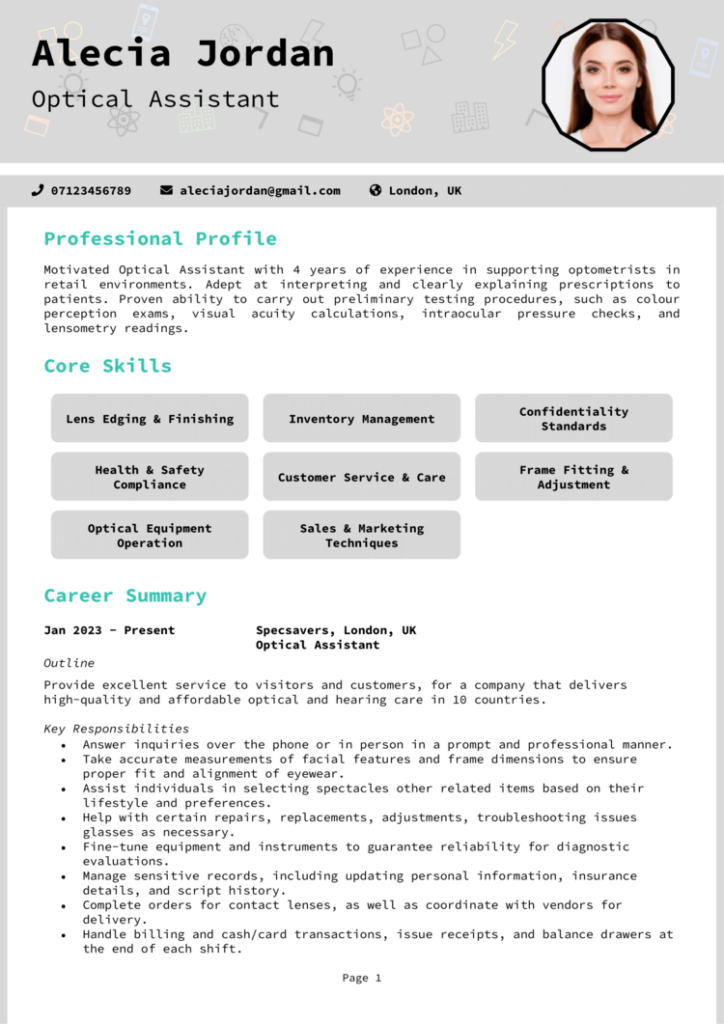
How to write your Optometrist CV
Learn how to create your own interview-winning Optometrist CV with this simple step-by-step guide.
Employers are looking for someone who can combine clinical knowledge, diagnostic accuracy, and excellent patient care. Your optometrist CV will need to do just that in order to succeed.
This guide will make writing a CV that highlights your qualifications and experience easy. With these tips, recruiters will see your CV as a sight for sore eyes.
Optometrist CV structure


Recruiters shouldn’t need perfect vision to see what makes you the best candidate for the role. A strong CV structure ensures recruiters can quickly find your top skills and experience: skip the cluttered frames and go for a layout that lets your expertise shine through, crystal-clear.
Here’s how to structure your Optometrist CV:
- Name and contact details – Keep contact details at the top so a potential employer can reach out to you. Having a picture of yourself is always up to you.
- Profile – Immediately draw recruiters in with a summary of your optometry expertise, clinical experience, and career aspirations.
- Core skills – Quickly list your biggest strengths, like your diagnostic abilities, technical expertise, and patient care skills.
- Work experience – Walk through your employment history in reverse chronological order, focusing on your clinical achievements.
- Education – List the qualifications and certificates that make you the right fit, like degrees and optometry certifications.
- Additional info – You can optionally list any relevant hobbies and interests which help to convey your commitment to health or precision-based work, along with any relevant awards.
The best way to format your Optometrist CV


Your CV should be as polished as a freshly cleaned lens. A clean, easy-to-read CV format will keep recruiters focused on your expertise, rather than getting bogged down by your formatting mistakes.
Worried your CV might look a little blurry? Here’s how to format your Optometrist CV:
- Bullet points – Help the recruiter skim quickly and pick up the important bits in your CV with ease.
- Divide sections – Logically organise the information and make it easy to navigate.
- Use a clean font – Stick with a professional font for clarity and readability.
- Keep it the right length – Aim for 2 pages: too long would start to bore the recruiter, and this is plenty of length to list the important details.
Optometrist CV profile


Your profile (or personal statement, for junior candidates) is the eye-catching opening pitch of your CV, giving recruiters a concise summary of your optometry expertise. Use it to demonstrate your experience, skills, and what value you’ll provide to companies that take you on board.
Optometrist CV profile examples
Profile 1
Experienced Optometrist with seven years of experience providing comprehensive eye care in busy clinical settings. Skilled in conducting eye examinations, diagnosing ocular conditions, and prescribing corrective lenses. Proficient in using advanced diagnostic equipment such as OCT and visual field analysers to deliver precise diagnoses and treatments. Committed to delivering personalised care and promoting overall eye health.
Profile 2
Dedicated Optometrist with four years of experience specialising in paediatric eye care and managing complex visual conditions. Skilled in performing thorough vision assessments, fitting contact lenses, and educating patients about long-term eye health. Experienced in collaborating with multidisciplinary teams to support holistic patient care.
Profile 3
Proficient Optometrist with over 10 years of experience in high-volume retail optometry practices, focusing on routine eye exams, contact lens fittings, and the early detection of ocular diseases. Adept at building strong patient relationships and recommending tailored optical solutions to meet individual needs. Skilled in maintaining compliance with industry standards and leveraging the latest diagnostic tools.
What to include in your Optometrist CV profile
Here’s what to include in your Optometrist CV profile:
- Where you’ve worked – Mention practices, hospitals, or clinics where you’ve gained experience.
- Your top qualifications – Highlight your optometry degree and any advanced certifications.
- Core clinical skills – Focus on tangible, hard skills like diagnostic accuracy, eye health assessments, or specialist procedures.
- Patient care achievements – Briefly mention a standout accomplishment, such as improving patient outcomes.
- Career aspirations – Include goals that align with the role, such as specialising in paediatric eye care or taking on leadership responsibilities.
What to include in the core skills section of your CV


This section is like your optometry toolkit – it shows you’ve got everything needed to assess, diagnose, and improve. Your CV skills give a very quick snapshot of the abilities that make you an outstanding optometrist.
Tailor this section to reflect the job description. For example, if the role focuses on paediatric patients, highlight your ability to work with children, while a hospital role might emphasise your expertise in advanced diagnostic techniques.
The key is to align your skills with the employer’s needs while showing off your clinical expertise and commitment to patient care.
Key skills that make an Optometrist CV stand out
- Eye Examinations – Conducting comprehensive vision tests to assess visual acuity and detect eye conditions.
- Contact Lens Fitting – Measuring and fitting contact lenses for patients, ensuring proper comfort and vision correction.
- Ocular Disease Diagnosis – Identifying and managing conditions like glaucoma, cataracts, and macular degeneration.
- Prescription Accuracy – Determining precise lens prescriptions to improve vision and address refractive errors.
- Retinal Imaging – Using advanced diagnostic tools like OCT and fundus cameras for detailed retinal analysis.
- Vision Therapy – Designing customised therapy plans to address binocular vision issues or eye alignment problems.
- Patient Education – Advising patients on eye care, preventive measures, and post-treatment care.
- Frame and Lens Recommendations – Guiding patients in selecting frames and lenses tailored to their vision needs and lifestyle.
- Collaborative Care – Working with ophthalmologists and other healthcare professionals for complex cases or surgeries.
- Regulatory Compliance – Ensuring adherence to professional guidelines and legal standards in eye care practices.
How to showcase your work experience on your CV


Your work experience section is where you prove your expertise as an optometrist. Recruiters want to see the impact you’ve made in your previous roles, so focus on the clinics, hospitals, or practices you’ve worked at, as well as the responsibilities you’ve handled.
Start with your most recent role and work backwards in reverse chronological order.
For those with less experience, internships, clinical placements, or volunteering roles are equally valuable. Emphasise transferable skills like communication, teamwork, and attention to detail.
How to structure jobs

- Outline – Describe the setting of your work, your role, and the type of patients or procedures you focused on.
- Responsibilities – Highlight key tasks like performing eye tests, prescribing corrective lenses, or advising on eye health. Use action verbs like “diagnosed,” “prescribed,” or “managed.”
- Achievements – A good CV will emphasise measurable results, such as introducing a new screening protocol or achieving excellent patient satisfaction scores. Figures and outcomes make your impact tangible.
Example jobs for Optometrist
Optometrist | VisionCare Clinic
Outline
Provided comprehensive eye care services in a fast-paced private clinic, focusing on patient satisfaction and accurate diagnoses.
Responsibilities
- Conducted routine eye examinations and prescribed glasses or contact lenses to correct vision issues.
- Diagnosed and managed ocular conditions such as glaucoma, macular degeneration, and diabetic retinopathy.
- Used advanced diagnostic tools, including OCT and autorefractors, to deliver precise evaluations.
- Educated patients on the importance of preventative eye care and long-term health strategies.
- Maintained detailed patient records in compliance with GDPR and clinical guidelines.
Achievements
- Reduced patient waiting times by 20 percent by improving clinical workflows.
- Increased patient retention by 25 percent through personalised care plans.
- Recognised for achieving consistently high patient satisfaction scores.
Optometrist | FamilyVision
Outline
Specialised in paediatric optometry and routine eye care for a local optometry practice, focusing on holistic patient care and education.
Responsibilities
- Performed comprehensive eye exams for patients of all ages, with a focus on children and adolescents.
- Fitted contact lenses, including complex prescriptions, and provided aftercare support.
- Referred patients to ophthalmologists for advanced treatment of serious conditions.
- Collaborated with local schools to promote eye health through educational initiatives.
- Maintained accurate documentation of patient care plans and prescriptions.
Achievements
- Increased paediatric patient engagement by 30 percent through community outreach programmes.
- Achieved a 98 percent accuracy rate in diagnosing visual impairments.
- Awarded Employee of the Month for exceptional service during a high-demand period.
Optometrist | OptiCare
Outline
Delivered high-quality optical services in a high-volume retail practice, focusing on patient care and eyewear recommendations.
Responsibilities
- Conducted detailed vision tests and prescribed corrective lenses tailored to individual needs.
- Assisted patients in selecting suitable eyewear, balancing style, comfort, and budget.
- Screened for early signs of ocular diseases such as cataracts and glaucoma.
- Trained new team members on clinical equipment and customer service standards.
- Ensured compliance with professional standards and maintained a clean, safe clinical environment.
Achievements
- Boosted sales of premium lenses by 20 percent through effective patient consultations.
- Reduced appointment cancellations by 15 percent by implementing reminder systems.
- Received consistent positive feedback from patients for professional and friendly service.
What should your education section include?


When it comes to your education, it’s all about clarity – no squinting needed to see why you’re qualified for the role. It’s a short but crucial section for an optometrist CV, as it highlights the qualifications and training needed for this specialised role.
Go over your degrees, certifications, and professional training in reverse chronological order. Include any additional coursework or workshops that demonstrate your commitment to ongoing learning, such as advanced diagnostic techniques or new optometry software.
If you’re a recent graduate, focus on relevant modules or clinical placements to showcase your potential.
Best qualifications for Optometrists
- Bachelor of Optometry (BOptom) – Covers clinical training, visual health assessments, and patient care.
- Master’s Degree in Clinical Optometry – Provides advanced knowledge in diagnostic techniques and specialised care.
- Fellowship of the College of Optometrists (FCOptom) – Demonstrates high-level expertise and professional recognition.
- Certificate in Paediatric Optometry – Highlights your ability to work with children and manage their unique eye care needs.
- Ocular Disease Certification – Shows your expertise in diagnosing and managing complex eye conditions.


